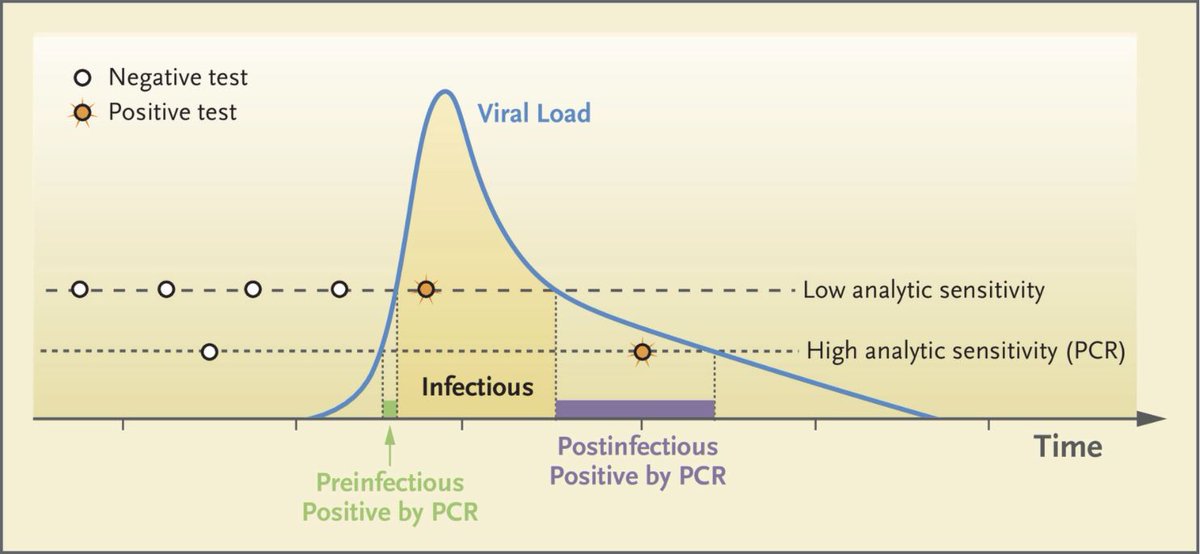
1. On Covid Testing: What We Have, And What We Need
This is a thread on a few basic scientific concepts, but they can be very, very confusing. Bookmark this thread so you can use it for reference, again and again.
This is a thread on a few basic scientific concepts, but they can be very, very confusing. Bookmark this thread so you can use it for reference, again and again.
2. First, be aware that there is no such thing as 100% certainty in testing, but for the sake of simplicity I will use the terms 'always' and 'never' in the following tweets not in a literal sense but in the sense of close to 100% (but not actually 100%).
3. Now three crucial terms: Sensitivity, Specificity, Frequency.
Sensitive: A test is sensitive if it never gives a false negative.
Specific: A test is specific if it never gives a false positive.
Frequency: How often you can easily and inexpensively be tested.
Sensitive: A test is sensitive if it never gives a false negative.
Specific: A test is specific if it never gives a false positive.
Frequency: How often you can easily and inexpensively be tested.
4. What We Have For Covid Testing
What we have is a supersensitive PCR test that cannot be given frequently. Because it is supersensitive, you will never get a false negative, i.e. if PCR test is negative, you can take it to the bank that you don't have Covid-19.
What we have is a supersensitive PCR test that cannot be given frequently. Because it is supersensitive, you will never get a false negative, i.e. if PCR test is negative, you can take it to the bank that you don't have Covid-19.
5. But PCR test is not very specific. You can easily get a false positive, i.e. the test is positive but you don't have Covid-19. In this context I am using "having Covid-19" to mean "you have or will definitely have Covid-19 symptoms soon AND you are contagious."
6. PCR test currently tests for the presence or absence of the minutest traces of novel Coronavirus DNA fragments. Consequently, it gives a positive reading for those who are contagious (good) but also for some who are not contagious and may never become contagious (bad).
7. In other words, if you have either a coronavirus viral load so small that it will never make you sick or contagious, or even a fragment of dead coronavirus, the PCR test will still flag you as a positive.
Now for an infrequent test, that is not a bad thing.
Now for an infrequent test, that is not a bad thing.
8. From purely an epidemic containment perspective, it's better to err on the side of quarantining some people who are not contagious than not quarantining some others who are contagious. So from that angle, & being an expensive, labor-intensive test, PCR test does its job well.
9. The downside of the PCR test is the economic havoc caused by over-diagnosing the population as infected when an unknown percentage of those tested positive, over 80% according to one Boston study, are not even contagious.
10. The other downside is, by the time we get test results, the infected person may already have infected many others. In other words, the PCR testing regimen quarantines many individuals unnecessarily, and also does not quarantine the really contagious individuals soon enough.
11. What We Need
What we need is an inexpensive, self-administered test that can be used frequently (e.g. daily) but is very specific, even if it is not very sensitive.
What we need is an inexpensive, self-administered test that can be used frequently (e.g. daily) but is very specific, even if it is not very sensitive.
12. In other words, a test that may not be very reliable when it says someone doesn't have Covid-19, but is highly reliable when it says someone is positive. If it is administered often enough, it's not that damaging if someone positive is missed for a day.
13. Put another way, we need a test that is the mirror opposite of the PCR test in sensitivity and specificity, provided such a test can be invented to be a low-cost, self-administered test.
14. Higher frequency of testing is the key. A frequent lower sensitivity test will catch more of the contagious cases, more accurately, and sooner than the current regimen of PCR testing. It can save more lives and be less damaging to the economy, thereby saving many livelihoods. 

15. People like Dr. Fauci know it. My daughter asked him a question months ago (in a "Q&A with Dr. Fauci" forum) about what one invention would be most helpful to his field of infectious diseases. He answered: "Get in touch with me if you can invent a low-cost Covid home test."
16. It puzzles me why Operation Warp Speed was not used to fund the development of such tests with the same focus and zeal as was used to invent vaccines. This could/would be just as helpful, if not more, to contain this epidemic.
The End
The End
• • •
Missing some Tweet in this thread? You can try to
force a refresh




